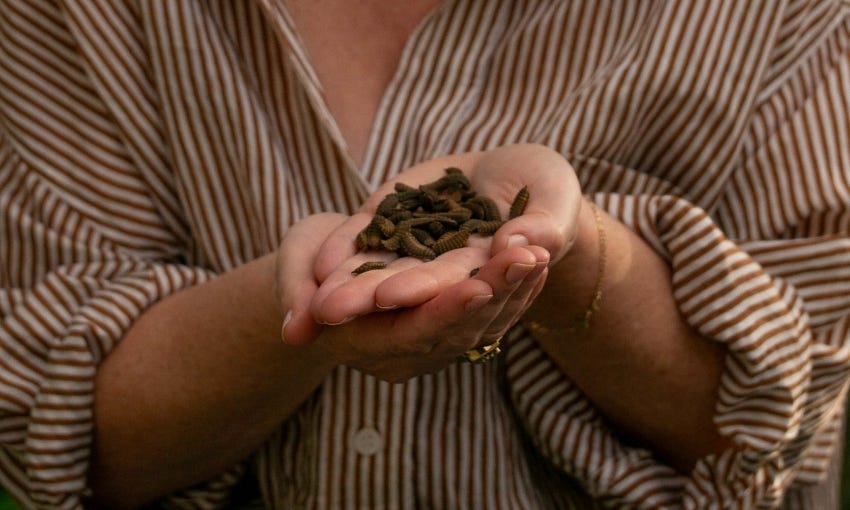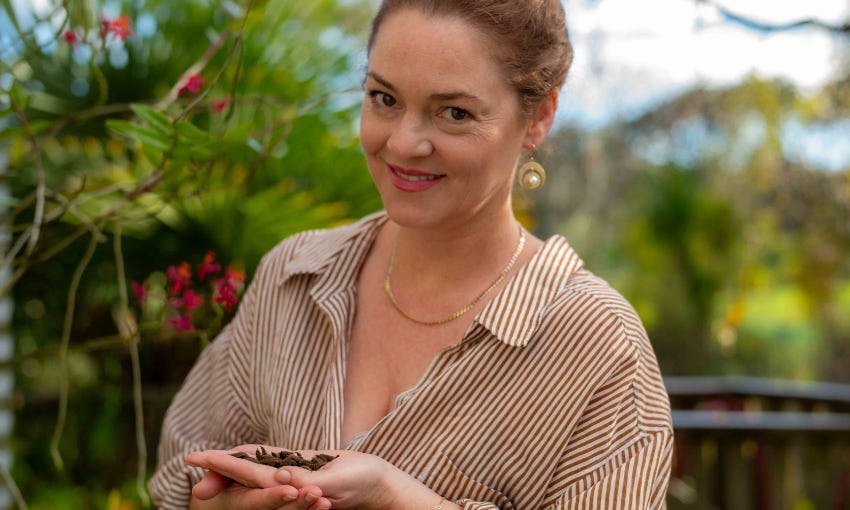Small grubs solving big problems
These ‘good grubs’ can deliver a climate-solutions double-whammy.
Kia ora, welcome to Future Proof. Thanks for joining me. This week: “significant demand” for the fast track, and how to tell people you don’t want to fly overseas. But first: a new start-up is transforming food waste into super-protein with… grubs?!
Image credit: Good Grub.
“They are known as the piranha of the insect world. They're incredibly voracious. They eat anything,” says Jessie Stanley, co-founder of Good Grub.
She’s talking about the larvae of the black soldier fly, a non-invasive species found around the world, including in New Zealand. The larvae – grubs which look a bit like slaters – eat “at lightning speed”, converting food waste into value in a cycle that takes just two weeks. (The adult fly form is “not like a gross house fly,” says Stanley. “It is really gentle and shy. You can pick them up and put them on your finger. They've got yellow little feet.”)
Stanley is a food technologist. She’s the brains behind the iconic Dessertalicious and co-founder of I Love Pies. Now she’s turning from pies to flies, in part inspired by the “shocking” food waste she’s observed over her career in food. Globally, more than one-third of food we produce is wasted or lost. “It's really criminal that we're throwing this valuable resource away,” she says.
At Good Grub, Stanley uses food waste to power “mini livestock factories”. The “livestock” are the grubs, munching through mountains of scraps diverted from landfill. After two weeks, the grubs are harvested to make a protein product for use in pet food and aquafeed – a sustainable alternative to meat-based proteins traditionally used. Even the grubs’ excrement, called frass, is harvested – it’s a biofertiliser packed with “a whole host of goodies” to enrich depleted soils.
In this way, the grubs are delivering an emissions reduction double-whammy. They’re diverting waste that would otherwise release harmful methane emissions in landfill. And they’re introducing a lower carbon protein into the pet food market, which has a substantial environmental pawprint.
Image credit: Good Grub.
“Full disclosure: I've tasted the grub. It's kind of nutty,” says Stanley. Once processed, it looks like a brown protein powder – no different to what you put into your smoothies. It’s a “super protein rich with micronutrients” that are good for gut health and cognitive function, she says. But for now, Good Grub is focusing on making protein to feed animals – and they’re already receiving preorders before production has begun in earnest.
Stanley started out growing a test colony of grubs in her sister’s bathtub. Now, the fledgling Good Grub start-up has a site lined up in Auckland and about half the funding it needs to get things buzzing commercially. With a pitch planned at the Icehouse Ventures showcase in Auckland next week, Stanley is hoping to raise enough capital to take the good grubs “high tech” with an agrirobotics set-up to drive efficiencies. “We have a passionate team, the site, the tech, exciting IP – we just need investment to get this off the ground.”
Show your support, join up today!
"Thank you to The Spinoff team for a balanced news, arts, culture, society site, for the (mostly) clear sighted writing and, especially, for the intelligent satire. There needs to be space to be able to laugh" - From a Spinoff member.
If you've appreciated our political satire, as well as our journalism, please consider becoming a member today.
Paris Olympics: a climate-fuelled heatwave, and a filthy river
Olympic sailing competitors in the south of France wore ice vests to combat the heat last week, as a heatwave spiked temperatures. The extreme temperatures seen in July 2024 across the Mediterranean would have been “virtually impossible” if humans hadn’t warmed the Earth by burning fossil fuels, according to a rapid weather attribution study.
Meanwhile, multiple athletes – including two Kiwi triathletes – have fallen ill after swimming in the Seine River. RNZ unpacks the 100-year ban on swimming in the river, the city’s attempted clean-up, and the poop protest that wasn’t.
How do I tell people I don’t want to fly overseas?
In her always-wise column, Hera Lindsay Bird offers thoughtful advice to a kind soul who wants to cut down their carbon emissions by avoiding long-haul flights, without coming across as judgy to friends and family who invite them overseas. “The best antidote to despair is always action, and I think your goal to cut down on air travel is a good one,” she writes, “If you talk candidly about your worries and the reasons you’ve arrived at your current position, I think you might find that people are a lot more curious and receptive to your ideas than you might think…”
‘Significant demand’ for fast track
At least 78 projects are “under active consideration” for inclusion on the list of projects for the Fast-track Approvals Bill, according to an OIA response received by the Environmental Defence Society (EDS) from the Ministry for the Environment. The Fast-Track Advisory Group was due to report back to Ministers last week with recommendations for projects to include and prioritise in the controversial legislation. Currently, the draft bill features a blank page where this list of automatically approved projects would be listed. After their initial OIA request to release the list was rejected, EDS has laid a complaint with the Ombudsman. Understanding the nature of fast-tracked projects is “fundamental to the bill’s environmental impact” and something the public should have the opportunity to comment on, EDS says.
More stories
Shanti Mathias reviews Scenes from the Climate Era, a play that evokes both fun and worry in a “symphony of different emotional registers”.
On a Gisborne farm – where your salad greens, sweetcorn, slaw and other veggies are grown – farmers are tinkering with nature’s tools to find the perfect recipe for healthy soil.
Floating bait stations are proving successful for predator control in the Auckland suburb of Wattle Downs, according to The Post (paywall).
Plug-in solar panels for your balcony are driving a solar boom in Germany.
Carbon credits are mostly “ineffective” according to a review from the global regulator of corporate climate targets.
Kaipara Harbour is home to one of the country’s largest snapper nurseries. An ambitious 10-year project is cleaning up its catchment.
Huge solar farms proposed for the Mackenzie district could have “catastrophic” consequences for kakī, one of the country’s rarest birds, Charlie Mitchell reports for The Press.
A “seed island” experiment at Waikereru near Gisborne is investigating the power of kererū poo for native restoration.
To finish this edition, please enjoy this unsettling kākāpō staring down from high in a tree, courtesy of the Department of Conservation. The world’s heaviest parrot, which is also flightless, nevertheless managed to escape over the predator-proof fence at Sanctuary Mountain Maungatautari several times over the last year. RNZ’s Our Changing World podcast gets the inside goss on how the mainland kākāpō have been faring one year on from their historic reintroduction to mainland Aotearoa.
Boom! Best re-skrarrks,
Ellen
Future Proof is looking for a sponsor!
Connect your brand with an insightful exploration of environmental news, reaching influential readers committed to sustainability and staying informed about the state of our natural world. Contact commercial@thespinoff.co.nz to learn more.
Got some feedback about Future Proof or topics you’d like covered? Get in touch with me at futureproof@thespinoff.co.nz















I love this! Setting the concept aside as an idea for a utopian cli-fi novel I intend to write, and hope more organizations follow a similar template.
Following Good Grub with extreme interest!